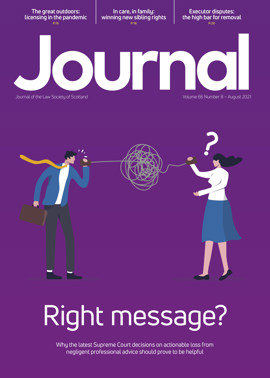The Word of Gold: Scratch my back?
Nominative determinism is the theory that people tend to gravitate towards work that fits their name. With no visible aptitude for either mining or the jewellery business, I have doubts. But perhaps Mr and Mrs Hill of Virginia were trying to test it when, in 1883, they named their newborn son Napoleon. If they hoped it would help him inspire multitudes, they must have felt thoroughly vindicated. Young Napoleon went on to become the author of Think and Grow Rich!, still the world’s biggest selling self-help book. Born in the township of Pound, he could well have spawned the equally plausible theory of geographic determinism.
Those with an “Aye, right” attitude to self-help books may greet Napoleon’s declamatory style with a weary sigh. But he has sound advice on how to generate ideas, and maintain the discipline to see them through.
Here is one nugget: “Surround yourself with intelligent people, willing to help you in a reciprocal relationship”. He wasn’t the first person to have this insight. “Cast your bread upon the waters, for it will return after many days”, says Ecclesiastes 11. Law firms are full of intelligent people, but often resemble an archipelago: lots of little islands, nominally part of a larger whole, but much of the time living independently of one another. It’s well recognised. “Silo mentality” has become an ugly cliché. But eradicating it has proved a lot harder than naming it.
Counter-incentives
Reciprocity is humanity’s cornerstone. If someone does us a favour, we are hardwired to want to repay them. One might expect law firms to be hives of collaboration, and within teams they are. But collaboration between teams, where each works consistently to create opportunities for the other, is much rarer. It’s not hard to identify the reasons. As the world has become more complex, and client needs more sophisticated, professionals have become highly specialised. Generalists are now virtually extinct. Secondly, for all their leaders’ high-level messaging about teamwork and valuing equally the different ways people can contribute to success, it’s well understood in most firms that the route to reward, status and advancement is individual billing. In this environment, focusing only on one’s own patch is a totally rational response. This approach has real consequences.
The Harvard academic, Professor Heidi Gardner, author of Smart Collaboration, encapsulates the difficulty: “Firms that collaborate earn higher margins, inspire greater client loyalty, and gain a competitive edge. But for the professionals involved, the financial benefits of collaboration accrue slowly, and other advantages are hard to quantify. That makes it difficult to decide whether the investment in learning to collaborate will pay off. Even if they value the camaraderie of collaborative work, many partners are hard-pressed to spend time and energy on cross-specialty ventures when they could be building their own practices instead.”
Gardner’s research shows conclusively that collaboration pays handsome dividends. Yet if firms do not provide a convincing answer to the question “What’s in it for me?”, all the academic evidence in the world will be of no effect. That’s why, to have any chance, incentives to collaborate and practices which encourage it must be embedded in the firm’s structures and processes. They can’t be left to individual discretion.
Collaboration needs planning
Collaboration should accordingly be a key metric in appraisal and reward. If I know that my efforts to originate work for colleagues will directly benefit me, I am much more likely to engage. And if, by “casting my bread on the waters” I make bread for others, it’s highly likely that over time they will do the same for me. Effective collaboration protects current business as well as generating new work. The more touchpoints we have with clients, and the more services we provide to them, the more likely they are to stay.
Firms serious about making collaboration a key component of their DNA, need to be strategic, and willing to commit sufficient time and resources. They might begin by planning a thoughtful, recurring series of meetings between teams that have the most obvious scope to collaborate, each team looking forensically at their and their counterparts’ clients and connections to identify where the best opportunities lie. Encourage them to challenge as well as support one another. These meetings need to be a lot more than informal chats over a sandwich. They have value only if they result in meaningful activity. Record every commitment, and nominate people from each group to be on the hook for following up and ensuring promises are kept. There is excellent software available for helping firms to originate, track and measure activity.
Finally, encourage everyone to prioritise “What can I give to my colleagues?”, over “What can I get out of them?” Altruism, far from being the opposite of self-interest, is one of the surest ways to advance it. Ask Napoleon.

Regulars
Features
Briefings
- Criminal court: Sentencing deconstructed
- Family: Litigation and lottery wins
- Human rights: Reinforcing the right to be forgotten
- Pensions: Plugging the LGPS exit credit hole
- Criminal law: The future of sexual offence trials
- Scottish Solicitors' Discipline Tribunal
- Property: Heat networks: the key to low-carbon heating?
- In-house: Power of the nudge






